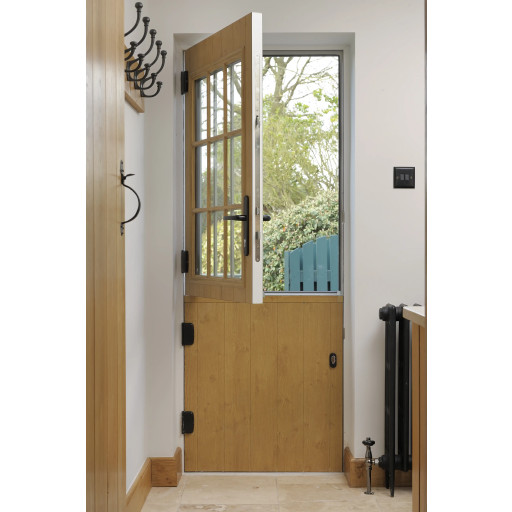Last Updated on 9 September 2024 by Josh Lucas
A composite door is a type of door made from multiple materials, including wood, PVC, and insulating foam, offering enhanced security, insulation, and durability. A uPVC door is made from unplasticized polyvinyl chloride, known for its low maintenance, weather resistance, and cost-effectiveness.
When looking for a new door for your home, there are a range of styles, designs and materials to choose from which can make it a bit of an overwhelming process.
Two of the most popular choices for homeowners are uPVC and composite doors. However, make sure to consider all of the differences between the two types of doors first, before you jump in and make a decision straight away. As this door will be the main entrance to your home, you’ll want to choose something not only secure and will keep more heat inside your home, but will also help to give the ‘wow’ factor to the overall look of your home.
uPVC doors are made by manufacturing a uPVC frame and inserting a PVC infill panel. The panel is typically a PVC skin either side with a styrofoam core, making the doors fairly light-weight in comparison to composite, aluminium or even timber.
Composite doors are constructed by compressing and glueing together multiple materials under high-pressure conditions. Some of these materials include uPVC, foam, wood and GRP (glass reinforced plastic). By using a variety of materials, this helps to ensure that the door excels in a wide variety of areas.
In terms of actual door thickness, most composite doors outshine uPVC doors with a measurement of 44mm, compared to the latter’s 28mm and the utilisation of superior materials in quality composite doors ensures strength, security, durability and weather resistance.
Composite doors are rapidly gaining popularity and challenging the dominance of uPVC doors. They’re adorning the entrances of numerous family homes and gradually becoming the ultimate preferred choice. In the past, uPVC doors were favoured due to their affordability, attractive appearance and ease of cleaning.
For a guide on buying a composite door, click here.
Looking for some specifics? Jump forward:
- uPVC doors vs composite doors comparison
- Pros & Cons of composite doors
- Pros and cons of uPVC doors
- Should you choose composite doors or uPVC Doors?
- FAQs
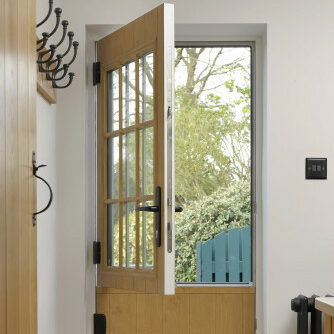
Composite Doors are known for adding the ‘wow’ factor to any property.
uPVC doors vs composite doors comparison
The 3 most common factors to consider when choosing which type of door to go for are the following; security, design & price.
Security
Composite doors are generally considered to be much stronger and more secure than uPVC doors. The combination of materials used in composite doors, including their solid timber core, provides excellent strength and resistance to forced entry. uPVC doors, while still providing decent security, may be more vulnerable to break-ins due to their plastic construction.
Design
Composite doors often have a more aesthetically pleasing appearance, resembling traditional wooden doors, something most people love about them. The outer skin can be designed to mimic the texture and appearance of real wood, providing a natural and authentic look. On the other hand, uPVC doors have a more contemporary and sleek appearance, with a smooth and uniform surface.
Both types of doors come in a variety of styles, colours and finishes to suit different styles.
Prices
When it comes to the cost of a new door, uPVC doors tend to be more affordable compared to composite doors. The higher-quality construction and timber components make Composite doors more expensive to purchase. However, composite doors are generally considered to last longer so you could argue the cost is less, as you are more likely to replace a uPVC door within ten years.
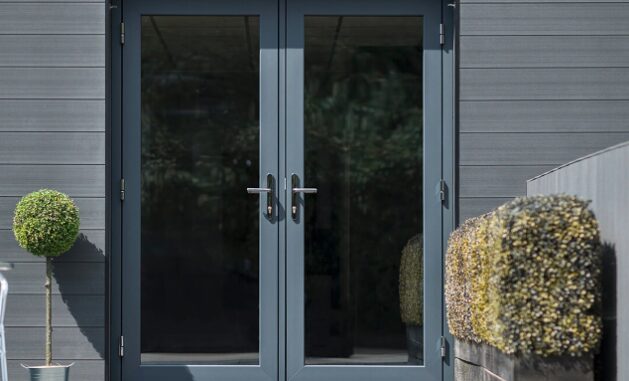
Our Deceuninck uPVC Flush Sash Glazed Doors are a beautiful, energy-efficient alternative to timber doors.
Pros and cons of composite doors
Here are the main pros and cons of composite doors.
Pros of composite doors
- Durability: Composite doors are known for their exceptional durability. The combination of materials, such as solid timber core and reinforced glass fibre, makes them highly resistant to warping, cracking and rotting.
- Insulation: Composite doors are excellent at thermal insulation. The multiple layers and insulating core help to minimise heat transfer, making them extremely energy efficient and potentially reducing heating and cooling costs.
- Low Maintenance: Compared to traditional wooden doors, composite doors require minimal maintenance. They do not need regular painting or staining and are resistant to weathering, fading and pests. Cleaning is usually as simple as wiping them down with a damp cloth.
- Aesthetic Appeal: Composite doors often mimic the appearance of real wood. They come in a wide range of styles, colours and finishes, allowing you to find a door that suits your taste and compliments your home’s architectural style.
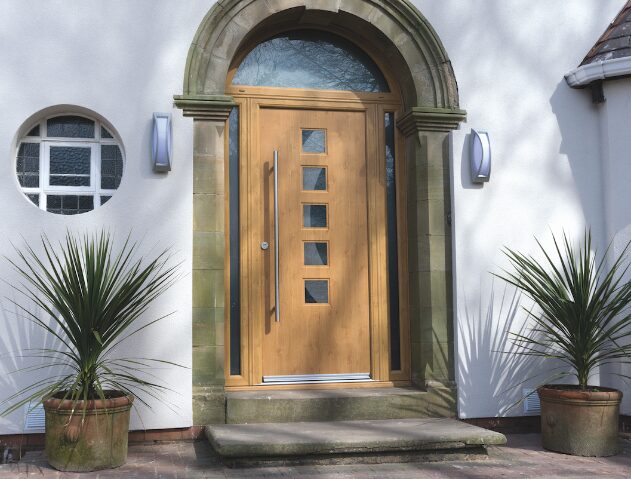
With a range of styles to choose from, our Solidor Composite Doors collection has something for everyone.
Cons of composite doors
- Price: The high-quality construction and materials contribute to the higher cost, leaving composite doors as one of the most expensive types of doors in the market.
- Limited Repairability: If a composite door gets damaged, it may be more challenging to repair, compared to UPVC or wooden doors. Depending on the extent of damage, you may need to replace the entire door or a significant portion of it.
- Weight: Composite doors tend to be heavier than other door options, like uPVC or wooden doors for example. Their high-quality construction and materials contribute to their higher price tag.
Often, the benefits of durability, security, installation and low maintenance make composite doors an attractive option for many homeowners, despite the higher upfront cost.
By considering your specific needs and budget, you can determine if this type of door is the right choice for you.
Pros and cons of uPVC doors
Here are the pros and cons of uPVC doors.
Pros of uPVC doors
- Affordability: uPVC doors are generally more affordable compared to composite or wooden doors. They offer a cost-effective option for homeowners who are working within a budget.
- Insulation: uPVC doors provide good thermal insulation. They help to keep the heat inside during colder months and prevent heat from entering during warmer months. The doors can also contribute to energy savings and improve the overall comfort of your home.
- Versatility: uPVC doors come in a wide range of styles, designs and colours. They can be customised to match your home’s aesthetic preferences and architectural style.
- Weather Resistance: uPVC doors are highly resistant to weather conditions. They are not affected by moisture, humidity or changes in temperature, making them suitable for various climates.
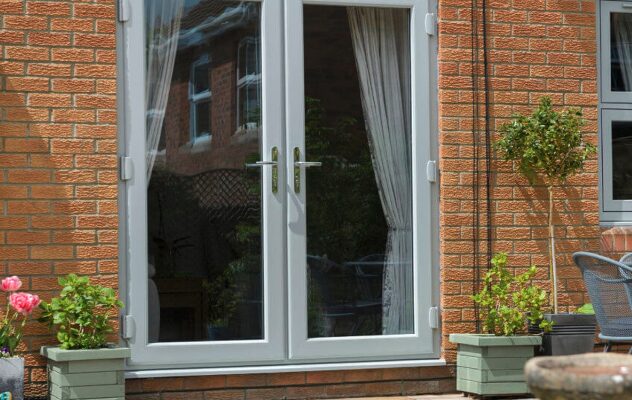
uPVC Doors provide great thermal insulation and help towards energy conservation.
Cons of uPVC doors
- Appearance: While uPVC doors offer versatility, some people may find their appearance less appealing compared to other door materials like wood or composite. Their smooth, plastic-like surface may not provide the same level of elegance or authenticity.
- Strength: uPVC are generally not as strong as composite or wooden doors. They may be more vulnerable to forced entry or impact damage compared to doors made from sturdier materials.
- Environmental Impact: uPVC itself is a type of plastic and is not biodegradable. Its production and disposal can have negative environmental implications, however, uPVC doors on the other hand, can in fact be recycled, reducing their impact to some extent.
- Limited Repairability: If a uPVC door gets damaged, repairing it can be more challenging compared to wooden doors. In many cases, the damaged section or the entire door may need to be replaced.
Should you choose composite doors or uPVC Doors?
When it comes to selecting a new door for your home, careful consideration is essential, just like any significant home improvement project. While price inevitably influences the final decision, your personal preference should also factor in.
If you’re in need of a new back door or garage entrance door where functionality takes precedence over aesthetics, uPVC may be the better choice for you. Whilst they may not have the same aesthetic or durability appeal to composite doors, uPVC doors tend to be more affordable, low maintenance, well insulated and have decent security, making them the ideal choice for those who need a cost-effective and low-maintenance solution.
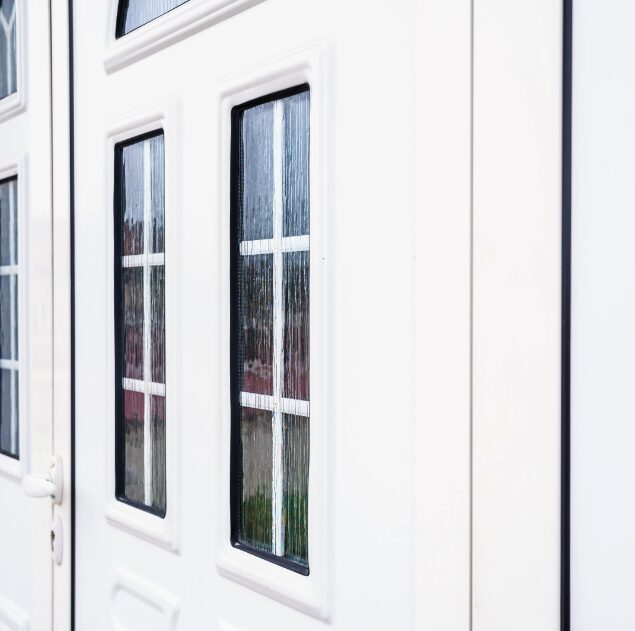
All our uPVC Doors come with an insurance-approved multi-point lock as standard.
However, if you genuinely prefer the appearance of a composite door but are hesitant due to the additional upfront cost, it might be worth waiting and saving up until you have enough funds to purchase the door that truly matches your preferences.

If you’re not sure what door to go for and need some help, just contact our amazing GFD team via this link.
Alternatively, you can speak to us over the phone by calling 01642 309576.
FAQs On The Difference Between Composite Doors & uPVC Doors
What is more expensive, uPVC or composite doors?
Composite doors tend to be more expensive due to the high quality materials used to make the door.
Which door has a longer lifespan?
Generally, composite doors usually last longer when compared to uPVC doors. As with anything, if regular maintenance is done, both doors will last much longer. Regular upkeep will help each door maintain its aesthetic look, as well as limit any damage (such as paint peeling, broken seals and loose hinges for example).
Are composite doors worth the extra money?
Composite doors offer exceptional longevity, security, thermal insulation and low maintenance, making them a worthwhile investment for any homeowner.
If you enjoyed this article, here are some others we think might be useful..
- Can you put a cat flap in a composite door?
- Choosing the right composite front door for. your home: a guide to making an informed decision.
- Exploring the diversity of our composite door range.
- Experience the GFD Experience: Teesside showroom now open!
- What type of front door is most energy efficient?
